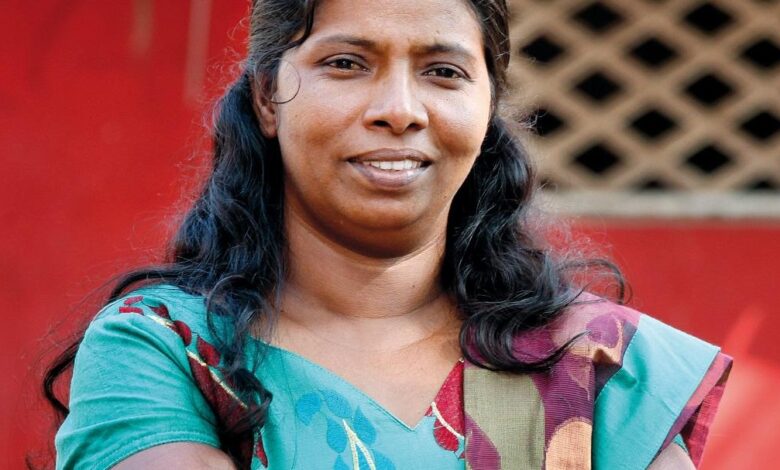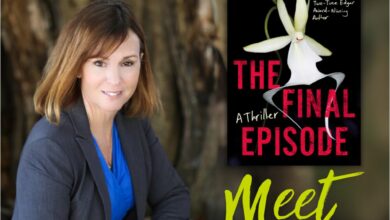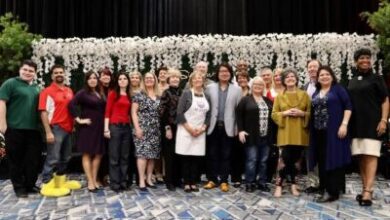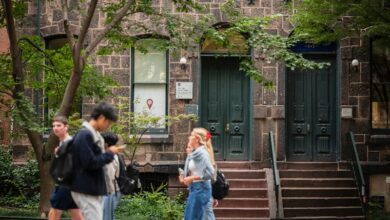From school dropout, plastic waste collector to University-featured author

Thiruvananthapuram: Dhanuja Kumari spends her days walking the narrow streets of Ravi Nagar in Ambalamukku, calling out to residents, “Chechi, we’ve come to collect plastic waste.” Dressed in a green overcoat over a pale yellow churidar, she carries a plastic sack as she visits each doorstep.
At 48, Dhanuja appears older than her years, with stress marks on her face, but she always wears a warm smile. Her life story is one of resilience and transformation.
Dhanuja dropped out of school in the 9th standard when her parents married her off to a 19-year-old artist specialising in the ‘Chenda,’ a traditional Kerala percussion instrument. She spent many years living in Chengalchoola, a slum in Thiruvananthapuram, facing numerous hardships. These struggles later inspired her writing.
She authored a book detailing her experiences as a slum dweller, titled Chengalchoolayile Ente Jeevitham (“My Life in Chengalchoola”). The book, now in its fifth edition, is included in the curriculum for BA students at Kannur University and MA students at Calicut University.
“I am not an imaginative writer. What I have written is what life gave me in Chengalchoola. I do not think it is literature, but my life,” Dhanuja Kumari told PTI, sitting in her one-room house in Rajaji Nagar, earlier known as Chengalchoola.
Dhanuja’s home is a structure made of tin sheets mounted on cement blocks, with a tin roof. It has no windows and includes a small cooking and washing area. The most expensive item in her home is an automatic top-loading washing machine.
Sitting on her queen-coat, which takes up most of the space in her one-room house, Dhanuja reflects on her journey to becoming a writer. “Our colony was notorious at that time, and we will be writing police petitions almost every day. They used to call me to write petitions, as I used to write them elaborately. That is what helped me sharpen my language,” Dhanuja said, with a smiling face as always.
She had a difficult childhood marked by her parents’ frequent arguments. “They had small issues, but sometimes they stopped seeing each other for a year or more. So they had sent me to a Christian convent, where I stayed and studied,” she said, recalling that a practice the convent insisted all students follow was her introduction to writing.
“The convent teachers asked us to write down whatever we had done during the day in a small notebook. The bad things we did and the good things we did. Those were my first writings,” Dhanuja said.
She continued doing the same when she moved into the present single room house along with her husband at the age of 14.
“My husband was just 19, and we were not mature enough to run a family. There were so many problems, and the discrimination we faced on the basis of caste and our life in the colony was too difficult to bear. I wrote all my pains, experiences, and little happiness we had in between,” Dhanuja said.
Despite these challenges, Dhanuja remained active in her community and worked hard to improve the living conditions of her fellow residents. “I used to tell everyone–the social workers, the researchers who visited our colony–that they were only interested in their study materials and not in our lives. I used to give public speeches. Hearing this, a noted writer, Vijila, prompted me to compile my writings as a book.”
Her book, published at the age of 38, was well-received and is now part of university curricula.
Dhanuja is currently working on the second part of her book. “This book again would be my experiences. I do not know how to write in the language of literature,” Dhanuja said.
Besides newspapers and children’s books, she has had limited exposure to Malayalam literature. “I had no opportunity to get those books, and my language is still the language of a class 9 dropout,” she said.
Today, Dhanuja leads a women’s group in Rajaji Nagar called ‘Wings of Women,’ which has its own library and engages in various social activities.
While she is recognized as a writer, Dhanuja continues to work as a ‘Haritha Karma Sena’ worker, collecting waste from houses. “It is my profession, and I do it with passion. It is my livelihood. There are different kinds of people, and their attitudes would also be different. I go to their houses as a worker, so I behave accordingly,” Dhanuja said as she continuously directed her team members at work.
Despite the recognition, she feels that her caste and background might still affect how she is perceived compared to other well-known Malayalam writers. “The most painful experience I had was when my son Nidheesh was discriminated against, humiliated, and ousted from Kerala Kala Mandalam. They called him names and treated him very badly,” Dhanuja said.
Nidheesh, who was a Chenda student at the prestigious Kalamandalam, later got a reappointment with the intervention of former Minister K Radhakrishnan, but he could not complete his education.
“What I want is to let the people know that there are many talents in our colony who, if nurtured, could reach great heights. I want people to stop discriminating against them on the basis of caste and the place they live,” Dhanuja said.
Agency
Source link




